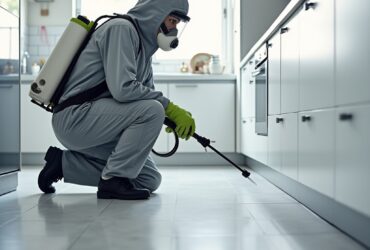Excess moisture and humidity at home is a warm invitation letter for many pests. An environment that has high humidity and moisture is ideal for pests like rodents and termites, as well as mold and bacteria. The dangers of pest infestation are many, including structural damage, diseases, and overall discomfort. Protecting our home from such invasions is necessary to improve your quality of life and keep your family members safe and healthy. In this article, we will discuss the dangers of high humidity and moisture and controlling measures to keep pests away.
High humidity and pest activity
As we just mentioned, an environment with high humidity is ideal for mold and bacterial growth. Pests like termites, cockroaches, rodents, and ants are also attracted to environments with more moisture content, so it increases the chances of pest infestations. Excess moisture can also end up damaging wood, the structural integrity of furniture, and your home itself. The increased risk of mold growth and pest infestation can also lead to persistent health issues. So in general, high humidity and the presence of moisture is not a good sign, but how to effectively control it? Lets discuss!
How do you administer effective humidity and moisture control?
If you notice moldy odours, water stains, warping on walls or floors, leaking pipes, etc., around your house, you can rightfully worry about high humidity and the problems it could potentially cause. But what are the strategies to prevent pest infestation due to high humidity and moisture? Here is a list:
Ventilation
Proper ventilation is the answer to controlling humidity in your house. Closed spaces restrict airflow and retain moisture; ensuring proper ventilation in narrow spaces, washrooms, and kitchens will definitely help you to keep your home dry and less humid.
Manage damages
Leaks, damages in the drainage, cracks and seals along water pipes can all end up contributing to the buildup of moisture. Properly managing these damages and fixing and sealing leaks and cracks will keep your place clean and dry. Spaces that are constantly wet tend to be ideal spaces for mold to grow, and cracks and gaps will be convenient entry points for pests, so make sure your home is dry and insulated.
Use a dehumidifier
A dehumidifier is a device used to reduce and maintain humidity levels in a space. You can use this device to defend your home against high humidity and the risk of pest infestation. The dehumidifier will keep the humidity in your home at a healthy level, improve the odour, and prevent the growth of mold and microbes. You can place them in spaces that are prone to being more humid and damp.
Regular inspection and maintenance
If you do not conduct regular inspections, many forgotten spaces in your home will keep getting ignored. So ensure you conduct an inspection at regular intervals to find any damaged or damp areas in your home and take maintenance measures to keep your home safe. You can’t imagine how fast unkept homes start to house pests and mold, so proper maintenance is crucial to keep your home in good condition!
Remove food sources
Apart from moisture and unsealed cracks, food sources are a major attraction for pests like rodents and cockroaches. Removing food sources, ensuring proper waste disposal, and keeping your food in airtight containers will drive away pests that come to your home in search of food.
Conclusion
Taking the right preventive measures is the key to a pest-free home, but when you are already facing a pest infestation, it is best to choose professional help. Ensure Pest Control Services is a major service provider that offers the best pest control in Dubai . Certified by the National Pest Management Association (NPMA), we are one of the most reliable pest control services in Dubai! Connect with us to learn more about cockroach pest control in Dubai and other services we offer.

